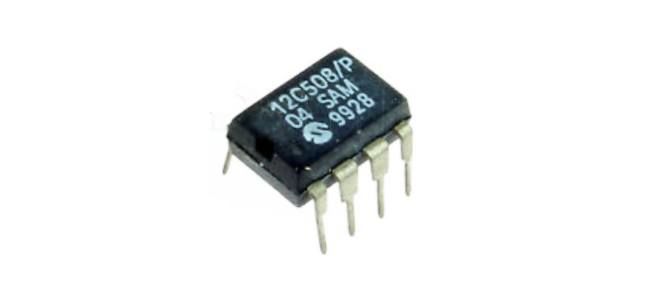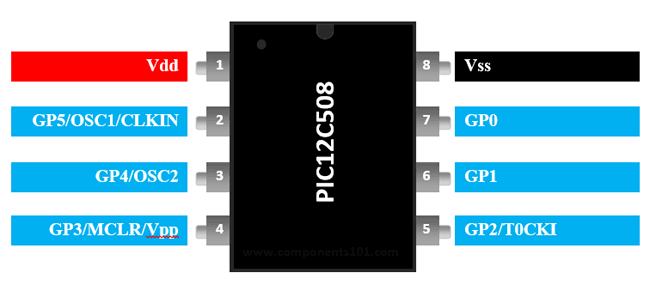PIC12C508 Microcontroller
The PIC12C508 is low cost 8-Pin Microcontroller from Microchip. It is a simple 8-bit controller with four oscillators including 4MHz internal RC oscillators. The controller is very old and has been in the market for a long time now.
Pin Description
|
Pin Number |
Pin Name |
Description |
|
1 |
Vdd |
Positive pin of MCU (typically +3.3V/+5V) |
|
2 |
GP5/OSC1/CLKIN |
General Purpose I/O 5 / Oscillator pin |
|
3 |
GP4/OSC2 |
General Purpose I/O 4 / Oscillator pin |
|
4 |
GP3/MCLR/Vpp |
General Purpose I/O 3 |
|
5 |
GP2/T0CKI |
General Purpose I/O 2 |
|
6 |
GP1 |
General Purpose I/O 1 |
|
7 |
GP0 |
General Purpose I/O 0 |
|
2 |
Vss |
Ground pin of the MCU |
Features
|
PIC16F676 –Simplified Features |
|
|
CPU |
8-bit PIC |
|
Number of Pins |
8 |
|
Operating Voltage (V) |
2.5 to 5.5 V |
|
Number of I/O pins |
6 |
|
ADC Module |
Nil |
|
Timer Module |
8-bit(1) |
|
Comparators |
Nil |
|
DAC Module |
Nil |
|
Communication Peripherals |
Nil |
|
External Oscillator |
Up to 4Mhz |
|
Internal Oscillator |
Nil |
|
Program Memory Type |
OTP |
|
Program Memory (KB) |
0.75 KB |
|
CPU Speed (MIPS) |
1 MIPS |
|
RAM Bytes |
25 |
|
Data EEPROM |
Nil |
Note: The PIC12C508 Microcontroller datasheet can be found at the bottom of this page.
Modern Replacement for PIC12C508: PIC12F508, ATtiny85
Alternative for 12C508/12F508: PIC12F629
Other PIC MCU’s: PIC12F508, PIC12F629, PIC12F683, PIC16F505, PIC16F628A, PIC16F676, PIC16F72, PIC16F873A, PIC16F876A, PIC16F886, PIC18F252, PIC18F25520, PIC18F452, PIC18F4520
PIC12C508 Overview
The PIC16F676 microcontroller belongs to the 12C series of Microchip microcontrollers. These controllers are compact low cost 8-pin controller with internal oscillator (4MHz) that can be used in compact and portable applications. The control has an operating voltage between 2.5V to 5.5V and supports one internal 8-bit timer. It also supports on-board programming (ICSP) and comes with safety features like Brown-out Detection, Watchdog Timer (WDT) etc making it reliable and suitable for industrial applications also.
It is well suited for low speed, low cost designs to perform basic arithmetic or logic functions. It is also suited for battery applications since it supports power saving sleep mode and wake-up from sleep functions. However as on date the controller is discontinued by Microchip and has been replaced by the advanced PIC12F508 from the 12F series controllers.
Programming PIC Microcontroller
PIC microcontroller can be programmed with different software's that is available in the market. There are people who still use Assembly language to program PIC MCUs. The below details is for most advanced and common software and compiler that has been developed by Microchip itself.
In order to program the PIC microcontroller we will need an IDE (Integrated Development Environment), where the programming takes place. A compiler, where our program gets converted into MCU readable form called HEX files. An IPE (Integrated Programming Environment), which is used to dump our hex file into our PIC MCUs.
IDE: MPLABX v3.35
IPE: MPLAB IPE v3.35
Compiler: XC8
Microchip has given all these three software for free. They can be downloaded directly from their official page. I have also provided the link for your convenience. Once downloaded install them on your computer. If you have any problem doing so you can post them on the comment below.
To dump or upload our code into PIC, we will need a device called PICkit 3. The PICkit 3 programmer/debugger is a simple, low-cost in-circuit debugger that is controlled by a PC running MPLAB IDE (v8.20 or greater) software on a Windows platform. The PICkit 3 programmer/debugger is an integral part of the development engineer's tool suite. In addition to this we will also need other hardware like Perf board or breadboard, Soldering station, PIC ICs, Crystal oscillators, capacitors etc.
Components associated with PIC: PICkit3, PIC Development Board, Crystal oscillators, capacitors, 12V Adapter, 7805 Voltage Regulator.
Applications
- Compact portable application
- Simple and cost effect design solution
- Low power battery operated applications
- Quick prototypes










